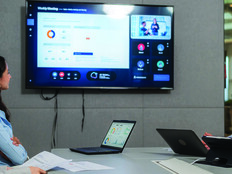Tech-Proofing the Millennial Workplace
Seventy-one percent of millennials are disengaged in the workplace. Is bad tech to blame?
A Microsoft and SurveyMonkey poll found that 93 percent of millennials cited modern and up-to-date technology as one of the most important aspects of a workplace, while Dell EMC’s "Future of the Workforce" found millennials, in particular, are likely to quit a job with substandard technology.
But millennials (and Gen Z) don’t just want gadgets.
Invest in Tech Made for Digital Natives
Raised with instant access to information, feedback and communication, millennials expect tech to add purpose and opportunity to their professional lives, and consistently seek jobs where tech is being used to create an impact.
Traditionally, millennials quickly pick up and master new technology, including business tools like the cloud-based Google Suite and social media or mobile apps. For workforces looking to remain competitive among millennial workers, investigating what cloud technology (such as Box or Okta) can streamline user experiences, and pursuing Software as a Service or Platform as a Service options (such as Salesforce or Microsoft Azure), will go far to create a workplace optimized for digital natives.
Optimize Tech for Mobile and Remote Work
Millennials crave a work environment that is flexible, yet cohesive. For years it’s been said that online messaging is favored among younger workers for day-to-day communication, more so than face-to-face interactions or phone conversation. Collaboration tools such as Slack or Microsoft Teams appeal not only to in-office staff as a quick way to stay connected with one another, but also to remote workers who want to join meetings or manage projects from afar.
When looking to retain millennial talent, a Deloitte survey found that more than half of its millennial respondents said that remote work opportunities boosted productivity, and three-fourths said they’d prefer to have more opportunities to work remotely. The ability to seamlessly communicate regardless of location provides the flexibility and company cohesion needed in modern workplaces.
READ: Check out how Microsoft Teams is making work more seamless.
Consider the Value of AI and Automation
As BizTech reported, artificial intelligence is transforming a wide range of industries, from retail to mortgage lending, and has the potential to significantly enhance the operations of nonprofit organizations as well, experts say. The number of enterprises implementing AI grew 270 percent in the past four years, according to Gartner’s 2019 CIO Survey, while worldwide spending on AI systems will grow to almost $35.8 billion in 2019, IDC reports.
According to Weber Shandwick, nearly a third of millennials understand AI and have some experience with it. This is significantly higher than previous generations. A separate study from Dell also found that 56 percent of millennials believe AI can be leveraged to automate routine and mundane tasks to increase productivity in the workplace. BizTech found AI-based tools like Cisco’s artificial intelligence and machine learning computing systems can help automate routine administrative tasks and help nonprofits improve their finance and human resources operations, fundraising, external communications and more.









